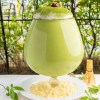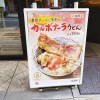Ah, Mondays! I’m sure you’re just like me in that you always wake up 30 minutes before your alarm goes off, bursting with energy at the idea of getting a start on spending the next five days at the office. Or, more accurately, you may be just like me in that you have a tendency to lie in order to cover up just how much you hate Monday mornings.
But when duty calls, you’ve got to go. As you struggle to convince your body to drag itself out of bed, maybe you try to sweeten the deal by promising yourself a tasty dinner as a reward for not just creating your own little three-day weekend by calling in sick. Yeah, you can make it through your shift if you’ve got something to look forward to at the end of it, like maybe some high-grade beef. And why bother cooking at home when Japan is filled with yakiniku (Korean barbeque) restaurants?
Not so fast there, cowboy. It turns out Monday is the worst day to go out to eat yakiniku.
So how exactly does the calendar conspire to crush your carnivorous dreams of succulent beef? Well, in Japan the wholesale markets for meat operate from Monday to Friday, and are closed on Saturday and Sunday. Allowing one day for delivery, this means that if you hit a yakiniku restaurant between Tuesday and Saturday, you’ve got a chance of being served meat that was purchased just the day before.
On the other hand, with the markets closed on Saturday, any meat being served on Sunday was originally purchased on Friday. And since the markets aren’t open on Sunday either, that means on Monday yakiniku restaurants have no choice but to serve meat that was purchased at least three days prior.
In short, there’s zero chance of being served the freshest beef on a Monday. Frankly, this news saddens us. For centuries, the deal has been clear: cows are delicious, and we eat them. We never imagined they would betray our trust like this.
The problem gets compounded if you’re the kind of yakiniku fan who skips the traditional cuts of meat and instead orders organs, which have recently had a surge in popularity with young women in Japan thanks to their low calorie count. Organs’ flavor tends to deteriorate much more quickly than normal meat. In addition, organs go through an additional screening process and usually don’t ship until a day after the meat from the cow they were procured from, meaning an even larger shipping dead zone over the weekend.
Ostensibly, visiting a yakiniku restaurant on any day between Tuesday and Saturday has an equal chance of scoring you the freshest beef. But while there isn’t one best day of the week to eat it on, apparently there is a best season for yakiniku.
Yakiniku aficionados claim the best-tasting meat has the highest fat content, making it juicy and flavorful. Cows tend to retain higher levels of fat in their bodies in winter than in other months in order to keep themselves warm, which in turn improves the flavor of their meat. Incidentally, this is the same phenomenon that gourmets cite as the reason tuna and yellowtail sushi are at their best during the coldest months of the year.
Of course, with summer just getting underway, we don’t have anywhere near the willpower necessary to resist the siren song of yakiniku until winter comes. Tuesday, though? Now that we can manage.
Source: Livedoor

 We try NEXT MEATS meatless yakiniku: Does it live up to our meat-lover expectations?
We try NEXT MEATS meatless yakiniku: Does it live up to our meat-lover expectations? Tokyo restaurant ready to feed you and friends yakiniku all day long for under 10 bucks
Tokyo restaurant ready to feed you and friends yakiniku all day long for under 10 bucks Late-night all-you-can-eat yakiniku for only 980 yen? Yes, please!
Late-night all-you-can-eat yakiniku for only 980 yen? Yes, please! Solo sukiyaki! Cook-in-the-counter hot pot is newest way to treat yourself to great food in Tokyo
Solo sukiyaki! Cook-in-the-counter hot pot is newest way to treat yourself to great food in Tokyo Tasty and cheap: 30 minutes of all-you-can-eat yakiniku for only 780 yen
Tasty and cheap: 30 minutes of all-you-can-eat yakiniku for only 780 yen Red light district sushi restaurant in Tokyo shows us just how wrong we were about it
Red light district sushi restaurant in Tokyo shows us just how wrong we were about it Japan’s massive matcha parfait weighs 6 kilos, contains hidden surprises for anyone who eats it
Japan’s massive matcha parfait weighs 6 kilos, contains hidden surprises for anyone who eats it Historical figures get manga makeovers from artists of Spy x Family, My Hero Academia and more
Historical figures get manga makeovers from artists of Spy x Family, My Hero Academia and more Haku is…Chihiro’s dead brother? Studio Ghibli fans blown away by Spirited Away theory
Haku is…Chihiro’s dead brother? Studio Ghibli fans blown away by Spirited Away theory Pokémon Sleep camping suite and guestrooms coming to Tokyo Hyatt along with giant Snorlax burgers
Pokémon Sleep camping suite and guestrooms coming to Tokyo Hyatt along with giant Snorlax burgers Tokyo Tsukiji fish market site to be redeveloped with 50,000-seat stadium, hotel, shopping center
Tokyo Tsukiji fish market site to be redeveloped with 50,000-seat stadium, hotel, shopping center Japanese ramen restaurants under pressure from new yen banknotes
Japanese ramen restaurants under pressure from new yen banknotes Limited-edition Carbonara Udon will anger noodle purists and pasta lovers 【Taste test】
Limited-edition Carbonara Udon will anger noodle purists and pasta lovers 【Taste test】 Anime girl English teacher Ellen-sensei becomes VTuber/VVTUber and NFT
Anime girl English teacher Ellen-sensei becomes VTuber/VVTUber and NFT Studio Ghibli releases new action figures featuring Nausicaä of the Valley of the Wind characters
Studio Ghibli releases new action figures featuring Nausicaä of the Valley of the Wind characters McDonald’s new Happy Meals offer up cute and practical Sanrio lifestyle goods
McDonald’s new Happy Meals offer up cute and practical Sanrio lifestyle goods All-you-can-drink Starbucks and amazing views part of Tokyo’s new 170 meter-high sky lounge
All-you-can-drink Starbucks and amazing views part of Tokyo’s new 170 meter-high sky lounge More foreign tourists than ever before in history visited Japan last month
More foreign tourists than ever before in history visited Japan last month French Fries Bread in Tokyo’s Shibuya becomes a hit on social media
French Fries Bread in Tokyo’s Shibuya becomes a hit on social media New private rooms on Tokaido Shinkansen change the way we travel from Tokyo to Kyoto
New private rooms on Tokaido Shinkansen change the way we travel from Tokyo to Kyoto Starbucks reopens at Shibuya Scramble Crossing with new look and design concept
Starbucks reopens at Shibuya Scramble Crossing with new look and design concept Studio Ghibli glasses cases let anime characters keep an eye on your spectacles
Studio Ghibli glasses cases let anime characters keep an eye on your spectacles Beautiful Ghibli sealing wax kits let you create accessories and elegant letter decorations【Pics】
Beautiful Ghibli sealing wax kits let you create accessories and elegant letter decorations【Pics】 Studio Ghibli releases Kiki’s Delivery Service chocolate cake pouches in Japan
Studio Ghibli releases Kiki’s Delivery Service chocolate cake pouches in Japan New definition of “Japanese whiskey” goes into effect to prevent fakes from fooling overseas buyers
New definition of “Japanese whiskey” goes into effect to prevent fakes from fooling overseas buyers Our Japanese reporter visits Costco in the U.S., finds super American and very Japanese things
Our Japanese reporter visits Costco in the U.S., finds super American and very Japanese things Studio Ghibli unveils Mother’s Day gift set that captures the love in My Neighbour Totoro
Studio Ghibli unveils Mother’s Day gift set that captures the love in My Neighbour Totoro New Japanese KitKat flavour stars Sanrio characters, including Hello Kitty
New Japanese KitKat flavour stars Sanrio characters, including Hello Kitty New Pokémon cakes let you eat your way through Pikachu and all the Eevee evolutions
New Pokémon cakes let you eat your way through Pikachu and all the Eevee evolutions Disney princesses get official manga makeovers for Manga Princess Cafe opening in Tokyo
Disney princesses get official manga makeovers for Manga Princess Cafe opening in Tokyo Sales of Japan’s most convenient train ticket/shopping payment cards suspended indefinitely
Sales of Japan’s most convenient train ticket/shopping payment cards suspended indefinitely Sold-out Studio Ghibli desktop humidifiers are back so Totoro can help you through the dry season
Sold-out Studio Ghibli desktop humidifiers are back so Totoro can help you through the dry season Japanese government to make first change to romanization spelling rules since the 1950s
Japanese government to make first change to romanization spelling rules since the 1950s Ghibli founders Toshio Suzuki and Hayao Miyazaki contribute to Japanese whisky Totoro label design
Ghibli founders Toshio Suzuki and Hayao Miyazaki contribute to Japanese whisky Totoro label design Doraemon found buried at sea as scene from 1993 anime becomes real life【Photos】
Doraemon found buried at sea as scene from 1993 anime becomes real life【Photos】 Tokyo’s most famous Starbucks is closed
Tokyo’s most famous Starbucks is closed One Piece characters’ nationalities revealed, but fans have mixed opinions
One Piece characters’ nationalities revealed, but fans have mixed opinions We asked a Uniqlo employee what four things we should buy and their suggestions didn’t disappoint
We asked a Uniqlo employee what four things we should buy and their suggestions didn’t disappoint Princesses, fruits, and blacksmiths: Study reveals the 30 most unusual family names in Japan
Princesses, fruits, and blacksmiths: Study reveals the 30 most unusual family names in Japan Tokyo food budget savior: All-you-can eat yakiniku, every night for less than four bucks
Tokyo food budget savior: All-you-can eat yakiniku, every night for less than four bucks All-you-can-eat meat offered by restaurant in the heart of Tokyo for less than 10 bucks
All-you-can-eat meat offered by restaurant in the heart of Tokyo for less than 10 bucks Yakiniku rice burger: A bento boxed lunch you can eat with one hand
Yakiniku rice burger: A bento boxed lunch you can eat with one hand All-you-can-eat yakiniku in Shinjuku for less than 10 bucks!
All-you-can-eat yakiniku in Shinjuku for less than 10 bucks! Testing 23 different yakiniku dipping sauces from the Japanese supermarket to find the top three
Testing 23 different yakiniku dipping sauces from the Japanese supermarket to find the top three Super-cheap yakiniku restaurant sells meat by the mouthful to give you exactly what you want
Super-cheap yakiniku restaurant sells meat by the mouthful to give you exactly what you want Good news for vegans – enjoy yakiniku entirely meat-free with these new plant-based products
Good news for vegans – enjoy yakiniku entirely meat-free with these new plant-based products Yakiniku Like in Tokyo starts serving up solo shabu shabu hot pot, and we tried it
Yakiniku Like in Tokyo starts serving up solo shabu shabu hot pot, and we tried it Is Daiso’s 500-yen grilling plate good enough for at-home yakiniku dinners? We find out!
Is Daiso’s 500-yen grilling plate good enough for at-home yakiniku dinners? We find out! We attempt to conquer the 7-hour all-you-can-eat yakiniku deal at Yakiniku Like
We attempt to conquer the 7-hour all-you-can-eat yakiniku deal at Yakiniku Like All-you-can-eat yakiniku, curry, and ice cream, all for just 10 bucks at this Tokyo restaurant
All-you-can-eat yakiniku, curry, and ice cream, all for just 10 bucks at this Tokyo restaurant Yakiniku Simulator coming to Nintendo Switch and smartphones
Yakiniku Simulator coming to Nintendo Switch and smartphones Meat lovers, you can now satisfy your carnivorous cravings at this revolving sushi restaurant!
Meat lovers, you can now satisfy your carnivorous cravings at this revolving sushi restaurant! Japan’s first alcohol-free and tobacco-free yakiniku restaurant a hit in Osaka
Japan’s first alcohol-free and tobacco-free yakiniku restaurant a hit in Osaka The Yakiniku Rules: dating advice from the front line
The Yakiniku Rules: dating advice from the front line
Leave a Reply